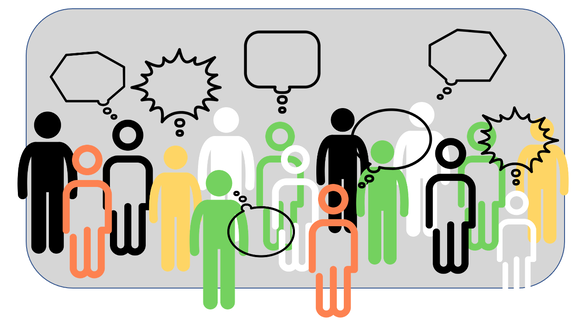|
(About a 12-minute read - plus a little thinking time if you have some. This is a migration and updated post. It was first shared at the FUNdoing.com Blog. We are moving theoretical posts to OnTeamBuidling in an effort to organize content. Thanks for being here!)
Preface: This post is a bit of a journey. And if I may say so, an important one. It relates to diversity. Diversity is never going away - nor should it. We need it. I'm guessing you've heard this before, "Diversity makes us stronger!" The challenge is (and this is where team builders can help), we have to do some work, to make it work. Grab a warm beverage and let's dive in...
I received this question from a fellow team builder, let's call him John:
John: I was wondering if you have come across/created any activities for groups that are interested in exploring generational issues/awareness? (I didn't have any specific activities to share with John, but I countered with a question and some reflection.) Chris: John, let me ask you this: What problems (or concepts) do you want to dive into with such activities? (I have a pretty good idea, but I'm interested in your perspective.) When I know what I'm working on, or towards, it's easier for me to find activities that may surface the desired behaviors and outcomes. I've had clients in the past expressing concern over the dynamics between the "older" and "newer" (i.e., younger) employees. When I worked with them, we explored the behaviors that were showing up (things seen and heard) during the program activities. I would ask which behaviors were working for them and which ones where not? Then, it was all about deciding what the group wanted to keep doing and what they wanted to change (or start doing). Some behaviors (good or bad) did relate to different ways of thinking, which could have been attributed to generational differences - but is that the REAL issue? From my point of view, it's about diversity.
John, you and I know diversity is an important topic in the workplace and in educational settings around the world. Age gaps (that might include different ways of thinking, acting and being) are, as I have experienced, diverse groups of people challenged to find ways to work together.
Thoughts?
John: I am not trying to solve any problem per se. I look at generational stuff as generational intelligence, like emotional intelligence with four categories:
1. self-awareness 2. self-management 3. social awareness 4. social management [Note from Chris: See the CASEL website for more on EI.] I would like to raise "generational intelligence." [from Chris: I love this term!] Is all this generational stuff just different behaviors as you mentioned? Is it different cultural dimensions? Is it a hoax? Or is it more? My leaning is toward more. I've worked with groups (7th graders, MBA students, etc.) for decades. I am getting older, and they remain the same age. So, it could be me being different/older but I see a difference in these groups. For one, they all seem nicer. And less strategic. And they jump to a solution...I call this firing...and they keep on firing without any sense of ready or aim (their world is one of velocity). They also do not seem strategically interested in going in a straight line from A to B and would rather go out in some tangential direction away from B but thinking that it still leads to B (don't know if I am clear here?). Do you see any of this?
So, I am big on raising awareness and managing that new awareness for a different result.
I was recently taught two new words. Ethnocentric (believing that your way is the only way or the best way) and ethnorelative (believing that there are many ways/thoughts/cultural preferences which are different than yours yet valid and important for you to master in order to be a great leader). This has changed my thinking immensely. My awareness and management of self and others has shifted because of this. I have moved away from binary thinking to dialectic (AND)...that multiple ways are both/all right. I would like to investigate generational issues with the same light. I am not a researcher [but I do] like to test things and collect data. Which ties into the experiential activity field we are in. Why not divide groups by generations and see how they solve problems/think? Is there any correlation across generations? Reflecting on my observations, people from different generations seem to look at each other as if they were aliens. How to shine light here?
Chris: It just so happens that (based on a recommendation from Michael Cardus) I started reading the book, Helping: How to Offer, Give, and Receive Help (2009) by Edgar Schein. So far, it's been an engaging read since I can correlate a lot of the teambuilding I do directly to helping behaviors. Here are a few points from the first two sections of the book that, I believe, can relate to our generational issues/awareness discussion:
This social economics concept (or social theory) struck a chord with me in relation to generational issues/awareness. Let's consider a group of multi-generational participants (e.g., co-workers). If one generation thinks ethnocentrically and the other thinks ethnorelatively the communication between the generations may not mesh with the social economics expectations of each generation thus causing friction.
I'm sure it's also possible for two different generations within a group to be the same types of thinkers. What if both groups (generations) had an ethnocentric point of view - each thought their way was the best way. How would we work with that situation (or those behaviors)? What if both generations were ethnorelative thinkers? Maybe the group doesn't have any problems? (Other than maybe, deciding what to do because everyone has a good idea!) Questions arise: How do we know what kind of thinkers we're working with? Is this about generational issues or is it about diversity? Where do you choose to focus?
For reasons of time, my conversation with John is on hold - but still on the table. I am grateful for his inquiry and the conversation. Our thinking helps us expand our understandings. Do we ever find the answers? Sometimes. At other times we just need to keep talking, staying in dialogue with the curious.
I'd like to invite you into a little reflection:
It's easy to understand this discussion of generational awareness and the work we do to foster its awareness is an ongoing journey. For now, I'd like to let these ideas take some hold and see how they grow. Discussions or dialogues like this can help us learn and grow in ways we might have never considered. I believe it's vital to bring up the questions that matter to us and engage in conversations with 'like' and 'other' perspectives to gain deeper understanding of different points of view and the people who carry them. I believe this to be true: It's not about against, it's about together. How do we help make this happen?
Please, keep doing the good work. We need you!
All the best, Chris Cavert, Ed.D.
P.S. Would you like a super-quick update when new OnTeamBuilding content is posted? Just fill out the form below and then click the big blue button. I'll keep you posted.
2 Comments
Dave Vermilye
2/24/2023 02:08:53 pm
Chris, as an "old man" and one who has been in the field for about 40 years, I could easily say "kids these days!" But I won't. However, that sentiment has been there for as long as I can remember. I actually wonder if some of the generational conversation is overblown. I minored in anthropology and cross-cultural communication - a long time ago. It is where I was introduced to the concept of ethnocentricity and implicit bias (although that term had not been coined yet, but the concept was there) That basis has served me well in my work. As you know I also work with the DiSC and other assessments. These assessments demonstrate the threads of commonalities across generations. I wonder if the perceived differences are the results of the type of work we do changing and the general philosophy of how we work changing. This ends up being a cultural change. Since we are ethnocentric to start with (we can't help this initial reaction) then it behooves us to take that next step to being ethnorelative. An easy way to demonstrate this difference, is to ask a group of diverse folks what they served for, let's say, Thanksgiving dinner. You will see visual reactions when someone shares that they served something other than turkey. And yet, what makes any meal choice right or wrong?
Reply
Chris
2/26/2023 04:11:22 pm
Thanks for contributing your thoughts Dave - I appreciate you! I share your thinking about activities. If and when others feel safe enough to offer their opinion we get to explore the different perspectives - only then can we begin to understand those around us.
Reply
Your comment will be posted after it is approved.
Leave a Reply. |
OnTeamBuilding is a forum for like-minded people to share ideas and experiences related to team building. FREE Team Building
Activity Resources OTB FacilitatorDr. Chris Cavert is an educator, author and trainer. His passion is helping team builders learn and grow. Archives
January 2024
|



 RSS Feed
RSS Feed